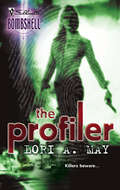Raamatut ei saa failina alla laadida, kuid seda saab lugeda meie rakenduses või veebis.
Loe raamatut: «Blackberry Winter»
Ain’t nothing but a stray away…
Loran had only just heard the quaint expression while she was waiting in the checkout line at the little discount store in the North Carolina mountains. Two old women had been talking about someone’s granddaughter, one who frequented places where she had no business being. And it wasn’t that the girl “hadn’t been raised” and didn’t know better, they had assured each other. It was that she apparently was just like Loran’s mother. Maddie knew better—but she did it anyway.
“Mother—”
“Loran, stop worrying. I’ll feel much better after I shower and eat something.”
“I wish I could believe you—you have no idea what it’s like having such a liar for a mother,” Loran said, and Maddie laughed.
“Ah, well. We all have our heavy burdens to bear.”
Loran kept driving. They weren’t far from the B and B now. Maddie did seem better. She was sitting up a little straighter, at any rate.
“You know what they say—if you don’t sow your wild oats when you’re young, you’ll sow them when you’re old.”
“Couldn’t you have picked someplace a little closer to home?”
“Home is a state of mind, my darling.”
Cheryl Reavis
Cheryl Reavis is an award-winning short-story and romance author who also writes under the name of Cinda Richards. She describes herself as a late bloomer who played in her first piano recital at the tender age of thirty. “We had to line up by height—I was the third smallest kid,” she says. “After that, there was no stopping me. I immediately gave myself permission to attempt my other heart’s desire—to write.” Her Silhouette Special Edition novel A Crime of the Heart reached millions of readers in Good Housekeeping magazine. Her books, The Prisoner, a Harlequin Historical title, and A Crime of the Heart and Patrick Gallagher’s Widow, both Silhouette Special Edition titles, are all Romance Writers of America/RITA® Award winners. One of Our Own received the Career Achievement Award for Best Innovative Series Romance from Romantic Times BOOKclub magazine. A former public health nurse, Cheryl makes her home in North Carolina with her husband.
Blackberry Winter
Cheryl Reavis
MILLS & BOON
Before you start reading, why not sign up?
Thank you for downloading this Mills & Boon book. If you want to hear about exclusive discounts, special offers and competitions, sign up to our email newsletter today!
Or simply visit
Mills & Boon emails are completely free to receive and you can unsubscribe at any time via the link in any email we send you.
For my editor, Tara Gavin, and my agent,
Maureen Moran. Thank you both
for bringing shovels.
With appreciation to Dawn Aldridge Poore,
fellow writer and my “mountain friend,”
who graciously answered all my questions
about the Appalachian experience.
Any mistakes are mine, not hers.
And special thanks to Linda Buechting and
Janet Wisst, and to Pat Kay, Lois Dyer,
Julia Mozingo, Myrna Temte, Lisette Belisle,
Laurie Campbell, Chris Flynn and
Allison Davidson—for their wisdom,
encouragement and boundless generosity.
CONTENTS
PROLOGUE
CHAPTER 1
CHAPTER 2
CHAPTER 3
CHAPTER 4
CHAPTER 5
CHAPTER 6
CHAPTER 7
CHAPTER 8
CHAPTER 9
CHAPTER 10
CHAPTER 11
CHAPTER 12
CHAPTER 13
CHAPTER 14
CHAPTER 15
CHAPTER 16
CHAPTER 17
CHAPTER 18
CHAPTER 19
CHAPTER 20
EPILOGUE
PROLOGUE
S he stood at the open window, feeling the cool breeze that always rippled off the mountain after the sun went down. She turned her head slightly to savor the feel of it on her face, never once taking her eyes off the line of trees that obscured the old logging road deep in the shadows on the mountainside.
She had no idea what time it was or how long she’d been waiting. There were no working clocks in the house except for the small windup alarm clock she used to catch the school bus on time. She didn’t dare leave the window long enough to go and get it for fear of missing the small flicker of light among the trees that would mean he had finally come for her.
A question formed in her mind, but she immediately pushed it aside. It was the kind of question her mother would have asked, the unanswerable kind a woman who didn’t matter couldn’t keep from asking. She didn’t want to think about her mother now—or her father. He lied when he didn’t have to, and he did as he pleased—always. Tommy wasn’t like him. Tommy wouldn’t—
Where is he?
For a brief moment she was afraid she’d spoken out loud, because if she had, if she voiced the fear she didn’t dare give a name, it would become real, inescapable.
She took a deep wavering breath and forced her hands to unclench.
No. He wasn’t like her father. Never.
Always before, meeting Tommy had been so easy. She would stand exactly where she was now, and in no time at all she would see the blink of light among the trees that meant he was waiting for her, for her—Maddie Kimball—when he could have any girl in the valley, girls whose families had money and whose fathers weren’t Foy Kimball.
It had never taken this long for him to get here before. If anything, he was apt to come too soon, before it was even dark enough for her to be absolutely certain she’d seen his signal. And when she did see it, she always waited just a little longer before she slipped away from the house, in case her father had seen it, too. Foy Kimball was a hard man to fool, primarily because he had done so many devious things himself and because hindering other people was a pleasure to him. Getting away tonight should have been easy. Foy wasn’t here. Her mother wasn’t here. The house was wonderfully and unexpectedly quiet, and all she had to do was watch for the light, then pick up the brown paper grocery bag that held a few of her carefully ironed clothes and go.
Easy.
And permanent.
She would never have to come back here again if she didn’t want to, never have to live hand to mouth with two people who only knew how to cause each other pain.
She could hear the faint rumble of thunder in the distance. She forced herself to move away from the window and cross the cluttered room to the front door. She stepped outside onto the porch, careful of the warped and rotted boards under her feet.
She knew that she wouldn’t be able to see the trees along the ridge any better from the porch, but she still looked in that direction, straining to find something, anything in the shadows.
She could smell the rain coming. The trees in the yard began to sway, and she could hear the wind moving along the mountainside treetop by treetop.
Tommy.
“Tommy,” she said in a whisper.
“Tommy!”
His name echoed into the distance.
If he was out there, he would hear her, and he would know that she’d missed the signal somehow. He’d know, and he would come to her.
She waited.
Listening.
Listening.
She stood at the edge of the porch, her eyes focused on the trees along the ridge until the shapes became meaningless, until the raindrops began to fall, until she knew.
He was like Foy Kimball after all.
CHAPTER 1
F or some reason, the drive from D.C. into Arlington was less hair-raising than usual this morning. Loran Kimball tried to put her worry aside enough to be happy about it. She wanted—needed—to see her mother today, and for once she might actually arrive only minimally stressed by the Beltway traffic.
She never knew what to say to Maddie these days, what to do. She didn’t know if coming to visit so often was making things easier for her or not. She couldn’t tell without specifically asking, and even if she did ask, she could never be certain of the accuracy of the answer. Maddie was so adept at seeming to indulge an inquiry, but, truly, she was the quintessential self-contained “private person.” Not standoffish. Not rude or unfriendly. Just private. She didn’t respond with precise answers to the things people asked her; she responded with whatever she wanted them to know. And, as far as Loran could tell, Maddie’s illness hadn’t made her any more forthcoming. She was quite willing to make some morbid joke about her imminent demise, but she was typically sketchy regarding what was actually happening to her body and how she felt about it. Loran had only lately come to recognize that she had never really known with any certainty how Maddie had felt about anything—except in the strictest parent-child context. She knew Maddie’s Rules of Etiquette and Social Behavior inside out, but Maddie herself was, and always had been, an enigma. What little real information Loran had gleaned about her mother had come from the example she’d set, not from anything she’d said. Did her mother have hopes and dreams beyond getting herself and her daughter educated and well-employed? Loran had no idea, and, at this late date, she wasn’t at all certain she wanted to find out, not when it was too late for Maddie to realize them.
She gave a quiet sigh and made the first of a series of turns that would take her deep into Maddie’s peaceful residential neighborhood, driving slowly down the tree-lined streets toward the bungalow where Maddie lived, for once paying attention to the houses and the front yards as she passed. They all reminded her of 1950s television somehow, of a world where families thrived intact and where wives stayed at home, mindlessly happy and wearing high heels and pearls, women who never worried about anything beyond the boundaries of their neatly manicured yards. They kept their houses and raised their children themselves, while their husbands went out into the real world every day and earned a decent living. It was not the kind of place she would have thought would appeal to Maddie, but clearly it had. Maddie had been living there ever since Loran had graduated from college eighteen years ago.
“Oh,” Loran said out loud as her mother’s house came into view. Maddie was an early riser, but her driveway shouldn’t be empty this time of morning. Her car was gone and the drapes at the windows were still drawn—a sure sign that her daylight-loving mother wasn’t at home.
Loran pulled sharply to the curb and parked. She hadn’t called first to let Maddie know she was coming today, and her immediate thought was that Maddie’s condition had worsened, that she had unexpectedly taken herself to the hospital again, and she hadn’t called yet to let Loran know.
Except that Maddie was Maddie, and it was just as likely that she wouldn’t call at all, if she could help it. Loran didn’t want to think that she might be physically unable to use the phone—but either way, it was a contingency she had planned for. She had the patient-information number at the hospital programmed into her cell phone.
When the woman at the hospital answered, Loran made no attempt to try to explain or to justify the reason for her call.
“I’d like the room number for Ms. Maddie Kimball, please,” she said, spelling both names.
There was a pause, one filled with the staccato clicking of computer keys.
“We have no one listed by that name,” the woman said.
“It’s possible she could still be in Emergency,” Loran said, trying to keep her voice steady and not grip the phone so tightly.
“I’m sorry. That name hasn’t been entered into the system.”
“If she just arrived—”
“All patient data should be entered right away. You could try again later, just in case there’s been some unforeseen delay.”
“Thank you,” Loran said. She snapped the cell phone shut and stared out the windshield. “Okay, Maddie, where are you?”
Out hitting the yard sales? Gone to meet some other early bird for breakfast? Either would be unlikely, Loran thought. She had no choice but to wait. She had the key to Maddie’s house and she rummaged through her purse until she found it.
She glanced at the bright blue sky as she got out of her vehicle—the new and far too expensive SUV Maddie called the domestic version of a Sherman tank—and walked toward the back door. It was going to be a beautiful fall day, crisp and clear. A group of children rode by on bicycles. Someone was burning leaves somewhere—probably illegally.
Loran stopped abruptly when she reached the carport. The back door was slightly ajar. She hesitated, then pushed it open wider and stood on the threshold, ready to run if she had to. She listened intently and she could hear a child babbling somewhere in the house and a man’s voice. After a moment, a portly bald man wearing a bow tie came into view. He was carrying a little girl and holding Maddie’s red watering can.
“What are you doing in here?” Loran asked bluntly.
He looked around in surprise. “Oh—we’re just watering the plants,” he said, clearly unperturbed by the question. He held up the red watering can for Loran to see.
“Water pants,” the little girl echoed and the man smiled at her. She smiled at him in return, then gave him a hug. “Hi, Daddy,” she said.
“Hi, little miss,” he said to her. “Aspiring linguist,” he said to Loran.
Loran stared at him. “You are…?”
“Andrew Kessler—this is Sara—we live next door.”
“Nest-or,” Sara said, making her father smile again.
“You have to be really careful at this stage,” he said to Loran. “They’re a walking instant replay, only the replay might not be instant. It might show up three days later in the middle of church.” He proceeded to water the herb pots on the kitchen windowsill.
“Do you…know where Maddie is?”
“Yeah—she gave me the address. Or the vicinity, anyway.”
“Where is she?”
“You are…?” he asked pointedly, in the same way she had done.
“Her daughter.”
“Oh, yes. Loran. We nearly stole your name and gave it to Sara, didn’t we?” he asked the child.
Sara nodded solemnly.
“Could you give me the…vicinity?” Loran asked.
“Sure. I don’t see why not.”
“Did she say how long she’d be gone?”
“Nope. Not really,” he said, watering another plant.
“Nope,” Sara echoed.
He set the watering can on the counter and reached for his wallet. It took him a moment to shuffle Sara, who didn’t want to be put down, and the contents of his billfold until he found a slip of blue paper.
“I’ll need that back,” he said as he handed it to Loran.
She looked at the paper. Lilac Hill had been written in her mother’s careful hand, with a phone number below it.
What and where was Lilac Hill?
“It’s a North Carolina phone number, I think,” Andrew Kessler said helpfully. “She said something about the mountains. That’s about all I know.”
“Was she—did she—?” Loran stopped, not quite knowing how to frame the question. This man might be allowed into Maddie’s house to look after her greenery, but that didn’t mean he knew anything about her health.
“She seemed fine,” he said, still being helpful. If he thought it odd that Loran didn’t know about her mother’s travel plans, it didn’t show. “Better than I’ve seen her in a while, actually. Kind of excited about going.”
Loran moved to the pad beside the telephone and scribbled down the number, then handed the blue paper back to him.
“Thank you,” she said absently, trying to process the information he’d just given her.
“Will you be staying for a while?”
Loran looked at him blankly.
“Do we still need to come and water the plants, is what I’m asking.”
“Yes. I won’t be staying. Thanks for doing that, by the way.”
“Oh, it’s our pleasure.”
“Pay sure,” Sara said, and this time Loran smiled.
“She’s very…pretty,” she said, but she’d been about to say “lucky.” Little Sara Kessler had a father who clearly wanted to be in her life, to talk to her, to carry her around with him—something far beyond Loran’s experience.
“We think so,” he said. “Well, that’s it for today. Come on, little miss. We’re off to wake up Mommy and take her to McDonald’s.”
“Mommy!” Sara cried, clasping her hands together.
“That’s right! Mommy! It was nice to finally meet you,” he said to Loran, making her feel slightly…absentee, in spite of the fact that she had never neglected Maddie. She had come to Arlington as often as she could.
She stood and watched him walk back across the yard. At one point, he set his daughter on the ground and they continued the rest of the way hand in hand, underscoring something Loran had realized a long time ago. Some men were meant to be fathers—and most men weren’t. Clearly, her own hadn’t been so inclined.
She thought suddenly about leaving the house this morning and about Kent, cranky and half-asleep when she’d tried to tell him about her restless night and her impulsive decision to go to Arlington again. He’d made a token offer to come with her, but he hadn’t meant it. She hadn’t really wanted him to come along. What she had wanted—needed—was some small indication that he understood a little of what she was going through. They had lived together for months. Her mother was dying, and her heart was breaking, and he had given her…nothing.
She was still watching as Andrew Kessler and his daughter carefully climbed the steps to their front porch and went inside the house. Step-climbing was clearly another much appreciated milestone. She tried to imagine Kent taking that kind of delight in a child’s simple accomplishments and couldn’t. He wasn’t interested in being a father, or a husband. He was interested in living unencumbered and in having a large corner office with his name on the door—not unlike herself. She and Kent made a beautiful, career-minded couple. Everybody said so. Loran and Kent. Kent and Loran. Wunderkinds of the investment world. She knew that Maddie didn’t like him much, regardless of the fact that she’d never said so. Loran had never quite gotten up the courage to ask why not. As inaccessible as Maddie’s thoughts might be, one did not want to ask her for an honest opinion unless one was ready to hear it.
“Maddie, Maddie,” Loran said wearily.
She didn’t understand any of this. Her mother was a home-body. She didn’t take unplanned trips, even when she’d been in the bloom of health. Apparently, Maddie expected to be gone for a time, or she wouldn’t have made plans to keep her philodendrons and her windowsill herb garden alive.
She just didn’t expect to be gone long enough to have to inform her only child.
The house was so quiet, in spite of the whirring of the refrigerator motor and the wall clock clicking off the seconds. The place looked homey, but it wasn’t, not without Maddie in it. There should be music playing, the oldie-goldie doo-wop station, and Maddie singing along even though she claimed to hate the songs of that era. There should be a pot of soup bubbling on the stove or bread baking in the oven.
The phone rang sharply, making Loran jump. She hesitated, then answered it.
“There you are!” her mother said cheerfully—as if Loran were the one missing.
“Mother, where—”
“I just talked to Kent. He told me you took a couple of days off and you were coming to see me today.”
“Well, that didn’t work out,” Loran said pointedly, and her mother laughed.
“Yes. Well. I…need you to do something for me,” Maddie said.
“Who is this?” Loran countered in honor of the many, many times she’d offered her services and been summarily turned down.
“I’m serious,” Maddie said. There was something different in her voice.
“What is it?” Loran asked, worried now. “Are you all right?”
“I’m doing great, considering.”
“What do you want me to do?”
“I want you to come here.”
“Where?”
“To North Carolina. To the mountains.”
“When?”
“Right now. If you leave right away, you can be here before dark, if you don’t take time to pack. The place isn’t hard to find. You can buy what you need after—”
“Mother, I don’t understand,” Loran interrupted.
“I know you don’t. I’m not sure I understand myself. I know I’m asking a lot, and it’s short notice. I’ll…explain when you get here. Or I’ll try.”
“Mother, you’re scaring me. Can’t you tell me something, at least?”
“I…not really. I don’t want to go into it on the phone. It’s important, Loran.”
And that was the only thing Loran was reasonably certain about. It was important. Nothing else would explain Maddie’s sudden disappearance or her unlikely request.
It was also inconvenient—for Kent. He had a big business dinner on Friday, one that required Loran’s presence, not for her investment-banking expertise, but because she apparently had an uncanny and probably fortuitous resemblance to the client’s late wife.
“Loran?”
“Tell me how to get there,” she said, making up her mind.
She could hear Maddie give what could only be a sigh of relief.
“Have you got a pen? You drive to Charlottesville, then to Waynesboro—”
“Hold on—okay. Go ahead.”
“Get onto the Blue Ridge Parkway at the first opportunity and head into North Carolina. Stay on it as far as the Highway 16 exit near Glendale Springs. The mountain scenery is going to be spectacular, and there’s a church in Glendale Springs with beautiful frescoes, but don’t stop. Take that exit…”
Loran wrote everything down, even the phone number she already had. “What is Lilac Hill?” she asked.
“It’s a B and B. I’ll get you a room. There’s one called the Rose Room. Very Victorian-girlie. You’ll like it.”
Loran stood looking at what she’d written, still bewildered, still worried.
“Loran?” Maddie said when the silence on Loran’s end lengthened.
“I’m here.”
“Drive carefully, okay?”
“I will,” she said. “Are you sure you’re all right?”
“Don’t I sound all right?”
“You sound all right. It’s that answering a question with a question thing that’s bothering me. Does your doctor know about this?” It suddenly occurred to her to ask.
Maddie laughed softly. “Actually, it was his idea.”
“He told you to go to the mountains?”
“He told me it was time to make sure the burners were turned off and the iron was unplugged—but this is what he meant. I’ll see you later.”
“Okay,” Loran said. “Later.”
She hung up the phone, stood for a moment, then dialed Kent’s number.
“Kent,” she said when he finally answered. “I have to— Are you awake?”
He said something unintelligible.
“Kent, listen. I have to go somewhere to meet Maddie.”
“Okay,” he mumbled.
“No, listen. I might not be back in time for the dinner Friday.”
“What? Why?”
“I told you. I have to go meet Maddie. I’m not sure when I’ll be back.”
“Loran, this dinner is important. The old man specifically asked if you were going to be there.”
“I know, but you can handle it.”
“I’m not the one who reminds him of his first wife.”
“I know. It can’t be helped. I have to see what Maddie wants.”
“Well, where the hell is she?”
“She’s…staying somewhere in the North Carolina mountains—a B and B called Lilac Hill. She wants me to come, and I have to go. I’ll call you when I get there. I’m sorry.”
“Damn it, Loran! Well, if you have to, you have to. I’ll make do, I guess. I’ll tell the old bastard…something.”
“The truth would probably work,” she said, and he laughed, hopefully an indication that she was forgiven for causing him such a major inconvenience.
“The call-waiting just beeped,” he said. “Catch you later.”
He abruptly hung up, and Loran stood holding the phone, still full of apologetic gratitude for what could only be described as a piddling display of empathy and understanding. She would have probably apologized a few more times if not for call-waiting. She tried to imagine what Maddie would have said and done in this situation. She might have said the same things Loran had—but she wouldn’t be feeling so tentative. Of that, Loran was certain.
“You are not your mother’s daughter,” she said out loud.
Tasuta katkend on lõppenud.









